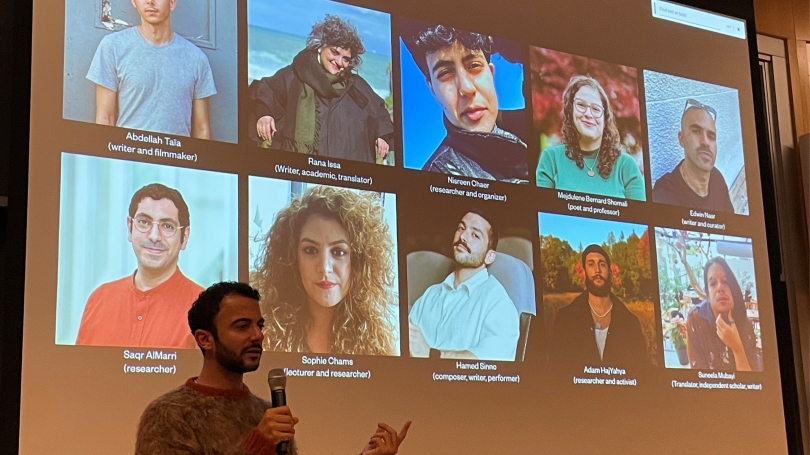
- Undergraduate
- Graduate
- News & Events
- People
Back to Top Nav
Back to Top Nav
Back to Top Nav
Umer Al Dulaimi, an MA '25 Comparative Literature student, shares his reflections on Marwan Kaabour's recent book talk at Dartmouth.
Umer Al Dulaimi, an MA '25 Comparative Literature student, reflects on the recent public talk held with Marwan Kaabour for his book The Queer Arab Glossary.
Kaabour's book offers the first-ever published collection of Arabic LGBTQ+ slang and captures the commonly used vocabulary of the queer Arab community, detailing its nuances and differences.
Dulaimi writes about the discussion:
On October 15, the Middle Eastern Studies Program at Dartmouth College hosted Lebanese designer, writer, and activist Marwan Kaabour for an insightful discussion of his groundbreaking book, The Queer Arab Glossary. The event brought together students, faculty, and community members for a critical examination of language, identity, and the reclamation of queer narratives within the Arab world. I had the pleasure of moderating this event and opening the Q&A with a series of questions about the archive, representation, and reception.
The Queer Arab Glossary compiles over 300 words and terms used across various Arabic dialects to refer to queer individuals. Ranging from humorous and endearing to serious and pejorative, the glossary offers a comprehensive linguistic analysis of how queer identities are perceived and articulated within Arab societies.
Kaabour emphasized the importance of documenting this linguistic heritage, "We must conserve memory," he asserted. Through compiling these terms, the glossary functions as a repository of knowledge that might otherwise fade away, especially since these expressions constantly evolve, adopt new meanings, and fluctuate in popularity. He highlighted that the most recent addition to the glossary is a term that emerged from Tunisia just last year, bearing connotations linked to K-pop music.
The discussion delved into how the glossary serves as a tool to dismantle colonial narratives and stereotypes about queer identities in the Arab context. Kaabour explained, "Colonial histories have imposed an external perception on our societies that depicts homosexuality as a Western import." This glossary, however, challenges such notions by excavating indigenous expressions of queer identities that have historically existed within these cultures.
A noteworthy aspect of the book is its visual dimension, featuring illustrations by Palestinian artist Haitham Haddad. Kaabour elaborated on the artistic choices underpinning the illustrations: "We wanted to bring the characters to life, introducing a sense of mythology into our queer imagination." For example, the 'dūdakī'—an Iraqi pejorative term meaning "riddled with worms"—is reimagined as a confident, Medusa-like figure with luxuriant worms for hair. Despite the derogatory connotations, the illustrations infuse these terms with joy and flair. Kaabour also intentionally employed a binary color scheme of teal blue and coral red to challenge aesthetics conventions, noting, "I wanted to have a disconcerting pair that doesn't usually go along."
The event was held on college premises in Haldeman 041 and was well attended by students and faculty alike.